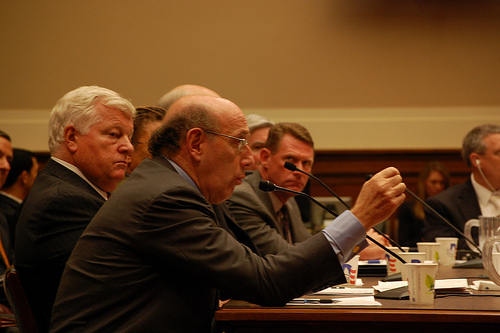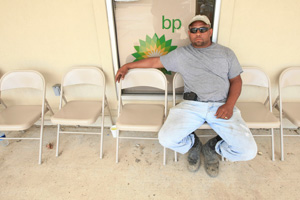
Photo by talkradionews, <a href="http://www.flickr.com/photos/talkradionews/4835308130/">via Flickr</a>.
Somewhere along the line, Kenneth Feinberg became the go-to mediator for the country. Most recently, he took a turn as executive pay czar, tapped by the Obama administration to oversee the compensation of executives at companies which received federal bailout money. He’s officially done with that job at the end of this month. Then, he’ll move into the job of Gulf oil fund czar full time, a role in which he’ll be charged with making sure those hurt by the spill are properly compensated.
Add these two roles to an already lengthy list of high-profile mediations. After serving as special master of the September 11th Victim Compensation Fund, dispensing $7 billion to the more than 5,000 survivors and relatives of those lost in those attacks, Feinberg administrated the fund established in the wake of the April 2007 Virginia Tech shootings. In June, he was called in to help mediate disputes with Maricopa County, Ariz.’s infamous Sheriff Joe Arpaio. All of this leads to an obvious question: Why him?
“I think there are millions of Americans that, if asked, could do just what I’m doing,” Feinberg told an audience at Public Citizen on Tuesday, in one of his first public appearances since he was tapped as spill czar. He acknowledged that tackling touchy issues is a tough job. “I have experience. I think that’s what people look to: Experience dealing with mass claims involving not only substance, but the emotion of people you’re dealing with,” he said.
He’ll be handling claims with plenty of both when he moves his focus to the Gulf spill on August 1. BP has yet to make the first payment into what will be a $20 billion escrow fund that Feinberg is tasked with doling out. The company is supposed to set aside $5 billion a year for the next four years for the fund. Getting that up and running can’t happen fast enough, as BP is already facing allegations of cutting spill victims off from much-needed funds.
Feinberg has already been busy making stops around the Gulf region in hopes of winning over residents who worry that the fund might yield less compensation than lawsuits against BP. He acknowledges that the job ahead of him is difficult, and possibly more complicated than other cases he’s mediated where the liability has been more clear. In the Gulf, he’ll have to deal with a litany of unknown environmental and health harms, most of which aren’t going to be immediately apparent.
“One of the challenges I will have, as I did with 9/11, is calculating with a murky crystal ball what is a future claim worth,” said Feinberg, citing health concerns that might manifest years later, or difficult-to-determine damages to the Gulf ecosystem. He offered a fishing example: If they determine fisherman will be out of work for a year and offer a $180,000 compensation, what happens when the fisherman argues that he might in fact be out of work for two years? “That individual will be offered $180,000, and if he or she doesn’t want it, don’t take it,” he says.
Other challenges lie ahead. First, there’s the question of what constitutes an eligible claim. “It’s easy if there’s a motel on the beach and no customers or no clients or guests because there’s oil there. Or you’re a fisherman who can’t fish because of the oil,” said Feinberg. “But what if you’re a motel 40 miles from beach and say business is down a third because of perception of the spill, even though the oil never got to the beach? Is that a valid claim?”
The other major problem will be documentation, especially in a region where many work in an underground economy with little or no documentation of their wages. To deal with that, he said he expects to have to take “much less documentation than would otherwise be required,” like letters certifying employment from ship captains rather than official tax forms or pay stubs.
He was also optimistic about holding BP accountable for reimbursing all injured parties with the $20 billion escrow fund. And, “if it’s insufficient,” he says, “BP has promised to honor any additional final obligations.”
Even with BP footing the bill, Feinberg will have his work cut out for him in assessing short- and long-term damages.
“I’m trying to get the money out to these people,” said Feinberg. “I’m the fiduciary for the people in the Gulf.”










